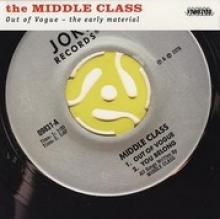Either way, the Middle Class aren’t too frequently mentioned when attempting to discern some hardcore timeline in general company as opposed to being surrounded by the supremely intelligent folks that are reading this right now. Despite the fact that there’s not any arguing with stating that the West Coast figured out faster tempos before Bad Brains and Minor Threat, Black Flag is generally construed as the genre’s founder. It’d be difficult to disagree, but a few folks recall the Middle Class playing shows more than a half year prior to Ginn’s group, then fronted by Keith Morris.
That’s a pretty huge point.
Black Flag’s Nervous Breakdown was issued just about the same time as the Middle Class’ Out of Vogue single. The release dates, though, don’t intimate when the tracks were actually laid down. But even knowing that can’t definitively pin point the beginning of the punk subgenre. It’s all worth thinking about, but the music that the Middle Class worked out over the course of a few singles and collected on Out of Vogue (The Early Material) warrants more listening than thinking.
This is a visceral music. A music about being different than what you see around you even as a punk scene was already in the process of coalescing around X, the Germs and other like minded Los Angeles bands. It’s an odd notion, being an outsider, but accepted within a community of a few hundred people with similar values.
The Middle Class, who can easily claim to have started cranking up punk’s tempo well before most other acts, were able to distill a teenage angst and relate it in oddly consumable terms even considering the nasty streak that runs through it all.
The band’s first few singles are still the most immediately entertaining, but even Homeland, a 1982 album featuring a drastically different sound more tied to early ‘80s’ British bands, has its merits. There’s nothing as anthemic, but its all impassioned playing and quirky tempos.
Being able to one up an opponent in an argument should grants a great sense of accomplishment. It’s not always easy to do, but if you store away these useful nugget of information for just the right occasion, summoning it usually works. So remember all of this tripe and get ready to break it out the next time you’re engaged with some know it all punker.
